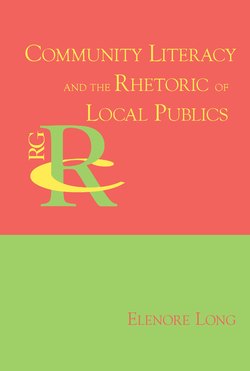Читать книгу Community Literacy and the Rhetoric of Local Publics - Elenore Long - Страница 9
На сайте Литреса книга снята с продажи.
ОглавлениеPreface
Charles Bazerman
Rhetoric, as a discipline, was born in the world to serve worldly needs. Typically these were the needs of power, exercised by the powerful—in court, parliament, political office, and the pulpit. The powerful could afford to pay rhetoricians for advice and to speak on their behalf. The wealthy could hire rhetoricians to educate their children to ensure dynastic power, and powerful institutions could sponsor schooling to provide continuing leadership and bureaucracies. Within such academic settings, rhetoric became a school taught art and an elaborated theoretical subject. However, the poor, the dispossessed, the victims of power, or even just the ordinary working people were left to their own spontaneous rhetorical savvy and carnivalesque resistance to assert their rights. Only rarely did they gain access to the most powerful tools of oratory and language.
Composition was born in the nineteenth-century school and university to teach the writing skills necessary for academic accomplishment and entering elite social roles upon graduation. Yet the increasing democratization of education in the nineteenth and twentieth centuries also brought in more people of various backgrounds and an interest in the needs of all parts of society. Universities often became sites of community involvement and progressivism, starting with the landgrants and famously with the University of Chicago at the time of John Dewey, George Herbert Mead, and Jane Addams. In the Post World War II and Civil Rights eras in the U.S., universities became increasingly engaged with community issues and what became eventually known as urban missions. So perhaps it is not so surprising that composition and rhetoric have engaged with community projects, where ordinary citizens gain public voice. Nonetheless, this return to the public sphere turns the power dynamics of rhetoric on its head and represents a major turn outward from composition’s traditional work in preparing students for academic and professional success.
Elenore Long’s Community Literacy and the Rhetoric of Local Publics—the latest volume in the Reference Guides to Rhetoric and Composition—reviews the major community rhetoric projects that have emerged in recent years, laying out the underlying logic, approaches and methods of each, and illuminating them through a theorized comparison. Long’s theoretical view unpacks the underlying metaphors of these projects to understand how each conceives the local public, the participation of individuals and groups, and the relations to larger institutions. In so doing she illuminates what role writing teachers and other communication specialists can take within community organizations and how such projects can serve as a means of community engagement for college writing students.
This volume gives us overview and insight into a major new direction in rhetoric and composition that foretells changes in undergraduate education and a reorientation of the university to the community. This volume brings these movements to a new level of understanding, thoughtfulness, and effectiveness.
